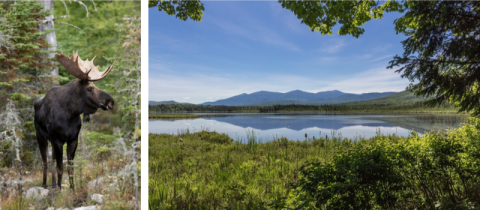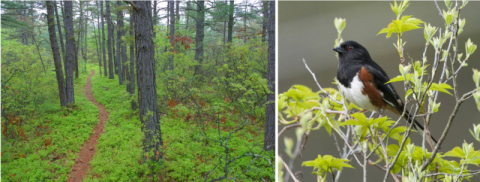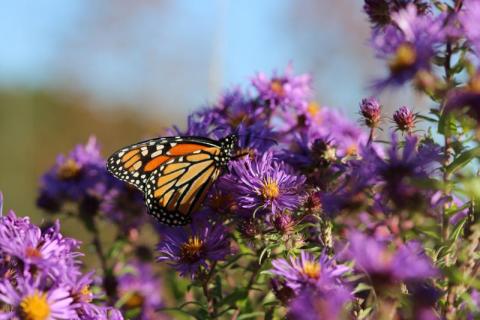Watching Wildlife: 5 Hikes to See Special Species
New Hampshire’s Species of Greatest Conservation Need (SGCN) are wildlife species that are rare or declining. In New Hampshire we have 169 SGCN identified in our Wildlife Action Plan. We talk a lot about many of these species, but we don’t often discuss where you might be able to see some of these species or at least learn more about the habitats they rely on. Here are five trails around New Hampshire that showcase a diversity of habitat types and where, if you are lucky, you might just catch a glimpse of one of these special wildlife species.
1. Pondicherry Wildlife Refuge – Jefferson and Whitefield, NH
The Pondicherry National Wildlife Refuge covers nearly 6,500 acres in northern New Hampshire and has a wide variety of wildlife habitats including 3 ponds, extensive wetlands, and forest. The trails here offer amazing views and great potential for wildlife viewing. Keep your eyes out for moose, northern harrier hawk, ruffed grouse, American woodcock, and marsh wren (all SGCN), among many others.

(Left) Keep an eye out for views of moose while hiking at Pondicherry. (Right) A view of Cherry Pond from the Shore Path at Pondicherry Wildlife Refuge. Photo: Kevin James
PONDICHERRY WILDLIFE REFUGE TRAIL MAP
2. Ossippee Pine Barrens Preserve – Madison, NH
Pine barrens are an extremely rare habitat-type in New Hampshire. As such, it is also home to many rare and declining species including two dozen threatened and endangered moths and butterflies, and several declining bird species like eastern whip-poor-will, common nighthawk, and eastern towhee (all SGCN). The Ossippee Pine Barrens preserve protects more than 2,700 acres of critical habitat. The trails here offer an excellent chance to see this unique habitat up close and maybe even catch a glimpse of wildlife!

(Left) A view from the trail at the Ossipee Pine Barrens Preserve. Photo: Eric Aldrich. (Right) While hiking at the Ossipee Pine Barrens, keep an ear out for the unique call of the Eastern Towhee, which some claim sounds like they are saying "Drink Your Tea!"
OSSIPEE PINE BARRENS TRAIL MAP
3. Great Bay National Wildlife Refuge – Newington, NH
Great Bay National Wildlife refuge protects 1,100 acres of the former Pease Air Force Base on the shores of Great Bay. The two trails here offer looks at a variety of habitats including vernal pools, beaver ponds, forests, fields, and a beautiful view of Great Bay. Keep your eye (and ear) out for bald eagles, American kestrel, American woodcock, and wood thrush (all SGCN).

(Left) A view of Great Bay from the trails at Great Bay National Wildlife Refuge. Photo: USFWS. (Right) American woodcock like young forest (or shrubby) and field habitats. Listen for them along fields and shrublands at dusk in the spring. Photo: USFWS.
GREAT BAY WILDLIFE REFUGE TRAIL MAP
4. Pack Monadnock at Miller State Park – Peterborough, NH
Miller State Park is located on the 2,290 foot summit and flank of Pack Monadnock in Peterborough and is the oldest state park in New Hampshire. You can hike up to the summit of Pack Monadnock on trails or drive to the top to enjoy the view. Pack Monadnock is a great spot for seeing migrating hawks in the fall. Pack Monadnock Raptor Observatory is staffed every day (weather permitting) from mid-September through mid-October. Great numbers of the common broad-winged hawk pass over the mountain each fall as they migrate south, but Golden Eagles and Northern Goshawks (both SGCN) can also be seen.

(Left) The view from the top of Pack Monadnock in Miller State Park. Photo: NH State Parks. (Right) Golden Eagles are occasionally spotted from the Pack Monadnock Raptor Observatory in the fall.
5. Silk Farm Wildlife Sanctuary – Concord, NH
The Silk Farm Wildlife Sanctuary offers nearly 4 miles of trails through a mix of habitats. Of note are the Field Loop and Old Orchard Trails, which offer views of field and pasture habitat. These open grassland habitats are increasingly rare in New Hampshire, but are great places to view wildlife. Keep your eyes out for northern harriers, bobolinks, swallows, monarch butterflies, bumblebees, and other pollinators (many of which are SGCN species).

The fields of Silk Farm Wildlife Sanctuary are a great place to look for monarch butterflies like this one enjoying New England aster flowers.
A few tips for wildlife viewing:
- Your best chance of seeing wildlife is early in the morning.
- Wildlife is best viewed from a distance. Do not approach wildlife. Bring binoculars to see all the details without putting yourself at risk or stressing wildlife.
- Practice Leave No Trace guidelines.
By Emma Tutein, UNH Cooperative Extension
Fall 2019 Taking Action for Wildlife Newsletter


